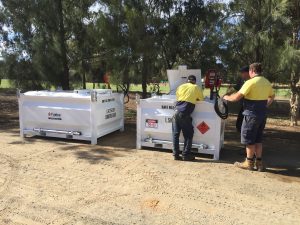The procuring process is key to efficient use of diesel and other liquid fuels. Factors influencing diesel purchasing decisions include storage life, potential fuel losses, and the legislative and financial requirements of large-scale onsite storage.
There are a number of buying strategies that can help you to negotiate the best price, avoid wastage and maximise your return on fuel investment.
Don’t try to only “buy when cheap”
Buying ‘cheap’ is generally a risky strategy that doesn’t always pay as it can leave you short at inconvenient times.
It’s important to note that retail diesel prices are not subject to aggressive discounting between fuel retailers, as petrol more commonly is.
In more remote and regional areas of Australia, diesel retail prices are set primarily by independent owner/operators. Higher prices reflect lower fuel volumes and sales along with increased freight and distribution costs.
Instead of trying to buy when fuel is cheap negotiate a fixed price with your local fuel supplier. If you use large quantities of diesel you may also want to consider tendering your fuel supply to gain greater savings.
‘Fresh’ fuel is more energy efficient
Limit the amount of fuel you purchase to no more than a month of the supply required to support operations. This reduces the likelihood of fuel going stale or becoming contaminated by nature’s elements.
Using old or stale fuel will reduce engine efficiency and increase service and maintenance costs.
Keep good fuel records
Keeping good records allows you to plan purchases well ahead of time. A tank gauging or fuel management system is also worth considering to ensure your records are accurate and on-hand.
Modify your purchasing cycle with predictable seasonal changes
If you’re in an industry such as Agribusiness where seasonal activity affects fuel demand … it is good practice to modify fuel deliveries to coincide with these seasonal changes.
This also reduces the likelihood of fuel becoming stale or contaminated.
Use a fuel supplier that guarantees fuel quality
Ensuring fuel is of high quality when it’s delivered to your site reduces repairs and maintenance to your engine.
Cleanliness of diesel is very important and can reduce engine efficiency and engine life significantly. These problems compound if large-scale storage is used.
Dust and water are the main offenders in fuel cleanliness. The good news is there’s a range of technology available to aid fuel cleanliness including tank filtration, filtration at the delivery point and dispensing filtration.
Also, consider the difference between summer and winter diesel … or the ‘Cloud Point’ property.
All diesel fuels contain wax, which is usually a liquid solution in the fuel. At low temperatures, the wax begins to solidify and crystals form in the diesel.
As the temperature drops, these crystals grow and can block filters, starving engines of fuel.
Fuel suppliers may supply diesel formulated to inhibit the formation of wax crystals in diesel fuel during cold weather conditions depending on your location.
To avoid winter waxing problems, plan to change over all your diesel fuel by the end of autumn and don’t keep summer fuel for winter use.
Your local fuel supplier can give you more specific information on summer and winter diesel specific to the diesel used in your location.
Maintain infrastructure
Ensure that tanks are well sealed to keep out dust and water, and install filtration devices on breathers, vents and fuel flow pipes.
Implement a regular servicing and maintenance plan on tanks and dispensing equipment to ensure seals and filtration are checked and replaced where required. Also ensure vents are not blocked or obstructed.
Safety and compliance
Economically, the cost of purchasing a compliant, single skin fuel storage tank, plus constructing the required bunding and safety controls could be prohibitive in making large-scale fuel storage a viable and cost-effective option.
Instead consider a self bunded, container style tank that requires no additional bunding or containment. Self bunded tanks are compliant, easy to transport and install … and relocate as refuelling needs change.
Fuelco has a range of products and services that can help your business implement better procuring strategies. Our self bunded fuel storage tanks allow you to store and manage your own onsite diesel. In addition to this, we have comprehensive servicing and maintenance services available to ensure costly break-downs do not occur at the most inconvenient time.
For more information please contact your nearest Fuelco team member or email sales@fuelco.com.au.
References:
http://www.nswfarmers.org.au/__data/assets/pdf_file/0005/35879/Energy-purchasing-Purchasing-liquid-fuels.pdf

